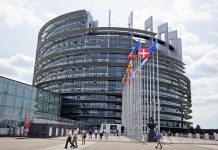Those who were convinced that Iohannis would retire or go on vacation to enjoy his election victory should review their prognosis. By no means did the president rest on laurels, and he is as active and virulent as in the campaign, as if there were still another round of presidential elections ahead of him. The main target is the same: PSD. As if Dăncilă had not already returned to her basic occupation, shopping.
„There is no room for PSD in the top management of state institutions. PSD has inhibited the development of Romania for the last 30 years. People have asked me „Mr. President, rid us of the PSD.” Do not expect a change of attitude from me in this respect. The president of Romania must be above the politics of the parties, but that does not mean that the president must be outside the politics in Romania. ”
But the first warning messages addressed to PNL also appeared, covered in a lot of tin: „I expect from PNL and the new Ludovic Orban Government, which is already doing a very good job, a total involvement so that by the end of 2020, we can offer the Romanians what they want: A Romania without PSD. To be well understood: a Romania without PSD in the state leadership.”
Why is Klaus Iohannis still restless, after winning his second term in office by a large margin, while the PSD is shattered? Because he knows there is a high risk that this victory will be of no use to him. He knows that if the PNL government does not meet the expectations and does not get a good score in the local and parliamentary elections, so that, together with other parties, the USR and the PMP, they will ensure a strong majority in the Parliament, he will not be able to achieve any of the goals he has set.
His victory in the presidential elections is a stage victory. So is the installation of the Orban government. If they are not seen to the end and consolidated by obtaining his majority in the Parliament, they would have been almost in vain. At this time next year, he will find himself in the same stalemate in which he was for a good part of the first term. Isolated in Cotroceni, forced to resort to guerrilla tactics in order to save what can be saved, condemned to move forward slowly, with small steps, which can only bring about minor victories.
Here is the key phrase uttered by Iohannis on Monday morning: „Self-sufficiency after these elections would be the biggest mistake of the PNL.” And even if he put it in the context of the strength which PSD still has in the Parliament and in the administration, his warning refers to the fact that „in the society some major issues are intensely discussed, and they must be resolved by the PNL government and parliamentarians.” Topics such as the compensatory appeal, the laws of justice and many others that make up the expectations package of the PNL and the president’s electorate.
Why is the warning about self-sufficiency a key message? Because even when talking about the danger of PSD coming back, the president is actually talking about the real risk facing PNL: to disappoint their own electorate. The need to oust the PSD from power is urgent first and foremost because, if they keep their access to the “keyboard”, this can be an obstacle to the fulfillment of the promises made by the president and liberals in the campaign.
The fears of some commentators that the votes obtained by Viorica Dăncilă in the second round, over three million, already represent the electoral base with which PSD will enter the local elections, are unfounded. It is as if you were saying that the PSD score in December 2009 was over 40% because Geoana had taken almost 6 million votes in the final with Basescu. Or that PSD had the same political quota in November 2014, based on the votes obtained by Ponta. False! The share of the PSD has remained unchanged from the elections for the European Parliament, the 20% obtained by Dăncilă in the first round, if not even lower, after the beginning of the internal quarrels.
What does this mean? It means the risk that the PNL will not take a good score in the local and the parliamentary elections and that the president will miss the opportunity to put his mark on important, profound changes, does not come from the PSD. It comes from PNL itself. From the PNL relationship with the anti-PSD electorate, more precisely. If they do not deliver corrections of the outrages committed by the Dragnea – Tariceanu government, if they do not deliver reform, they will be penalized on both rounds of elections, no matter the extent to which their mayors will manage to get votes from the PSD mayors. That is, in fact, what Iohannis warned would happen if they were „self-sufficient.”
The president has taken the reins in his hands because he knows how high the expectations of his voters are, how demanding they are as compared to PSD voters and how easy they are to be disappointed if they notice that PNL is mimicking change. The compensatory appeal, the Magistrates’ Investigation Section, the special pensions, the two-round elections are just the first tests that the Orban government and PNL parliamentarians have to pass. But more difficult ones will follow. And the president’s tone is likely to become harsher if his political partners hesitate or fail. The year to come is a trial by fire for Iohannis, Orban and their teams.
All of them are in the same situation in which Iohannis once was, at the end of 2015, when the Cioloş government succeeded. But today, four years later, the president can no longer afford to miss. He has no time left. Any delay may compromise his second term. A poor PNL score at the local and parliamentary elections would be a terrible blow, from which he could hardly recover.
As for the Cioloş government, the main challenge for Ludovic Orban is the confrontation with the harsh reality that almost everything has to be changed, from the ground up, in the Romanian administration. It is hard to find an area or institution where there is no need for deep reform.
However, the biggest risk for the new government is to try to change everything and fail to change anything at all. Here is a list of actions, valid at the beginning of Cioloş’s government, still valid today, which should prevent a potential failure, due to the multitude and complexity of the corrections that are required.
- Prioritization. The new government could not change everything that should be changed even if they had a four-year term. But even in a year’s time, a lot can be done. We start from the hypothesis that, finally, there is a will and much less fear of politics. The key decision will be to choose those important battles in which the executive will engage and which must combine a major impact on the lives of citizens or the economy and a high probability of being won in a short time.
- Partners. From the perspective of prioritization as well as the chances of success, it is essential that the government bring together institutional partners to help it carry out the projects quickly, with minimal hesitation and errors. There are several organizations in the business environment, think tanks and NGOs that have proven for years that they know what it is about. It is essential that the government ask for their point of view and take it into account when they need to find out what are the three biggest problems facing private companies in their relationship with the state. Or what are the three main obstacles blocking the construction of highways. Or the three measures that are required to stop the waste in spending the funds for health, education and all other essential areas.
- Consultation. It is essential that the first channels of communication with the organizations described above but also with the associations that group a large number of citizens be opened as soon as possible and that the feed-back is assimilated in a really useful way. That is, the process of gathering ideas and proposals should be extremely short and the energies be channeled on honing the two or three essential projects that will result from prioritization.
- Transparency. The fact that the Prime Minister has already referred to the importance of transparency is a good sign. But a few statements of good intention will not suffice to shake the foundations of a real culture of secretiveness that dominates the state institutions. It will be necessary for all ministers to take drastic measures against all those who refuse to apply Law 544 on free access to information of public interest. Why is transparency so important to the mission of the new government? Because the publication of purchase price lists, for example, as well as other information hiding the dirty dealings between the heads of institutions and their favored firms that provide them with products and services, will have the same effect as the liberalization of access to the Trade Register, almost twenty years ago. For journalists and NGOs there will be a huge reservoir of data that will highlight the profound anomalies of certain institutions and the drainage channels of public money. And all the disclosures of the civil society will become an extra resource, free of charge, for the executive’s use. Due to it, corrections to public procurement mechanisms can be quickly imposed, but, in particular, money can be saved.
- Reactivating the Control Units. Each ministry has a Control Body, whose activity is so discreet that we often forget it still exists. The reason for their programmatic discretion is that, most of the times, they are led by people whose main mission was to case the joint for senior officials and turn a blind eye to all the dubious business in the institutions. Only when the DNA announces that a minister, secretary of state or director is subject of investigations, does one remember that someone else should have first cried foul at suspicions of corruption. The government should quickly start assessing all the Control Bodies in the ministries, beginning with the one of the prime minister, and quickly refresh the most inefficient ones. An essential criterion for evaluation, which would instantly reveal complicity with the Mafia, is the number of referrals to DNA or the General Prosecutor’s Office. Like transparency, the reactivation of the Control Bodies would allow the Executive to easily identify the neuralgic points in the decision-making and control mechanisms of the administration, but also to dismantle the nodes in the corruption networks within the central apparatus.
- Evaluation of the computerization projects. These represent perhaps the greatest resource for rendering the administration efficient, but also one of the main targets of the mafia networks with accomplices in the former governments. Again, with the help of civil society partners, the most serious frauds committed in relation to IT projects could be inventoried without too much effort. Once the investigators are notified of the suspected fraud and the expensive contracts are canceled, some of the computerization programs could be relaunched, which would have a direct and immediate impact on the administration’s performance.
- Total cleansing of the public companies. They represent the most important bastion of the trans-party mafia. An honest assessment of the costs, of the contracts concluded and of the management teams must be started urgently. And the conclusions must be followed by firm measures to extract the networks of bogus companies and to dismiss the politically appointed heads. Without a hard intervention against them, there is no chance of annihilating the black holes of the economy and removing disruptive factors that negatively influence the private economy. The resumption of the abruptly interrupted process of appointing private managers is also a priority. It is no good cleaning if afterwards you appoint directors of the same species as those who have just been dismissed.
- Recruitment of professionals. None of the above can be accomplished without competent people. They exist. You just need to search and recruit professionally. Obviously, there will also be a need to rethink the remuneration system, so that they will be tempted to even leave a job in a private company. Together with an attractive package of benefits, it will make the mission of a recruiting firm possible. Last but not least, it is worth resuming the program of bringing back to the country graduates of foreign universities, a program compromised and closed by the Tariceanu government.
These initiatives only, if successfully completed, would make the new government the most successful in recent history. None of them is doomed to failure if they are invested with the interest and energy we have observed so far in most ministers only when it comes to getting rich or keeping away from prison.



















